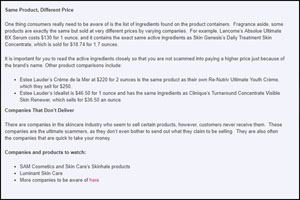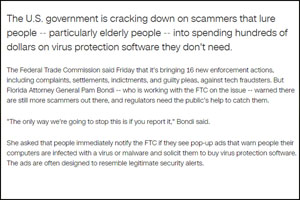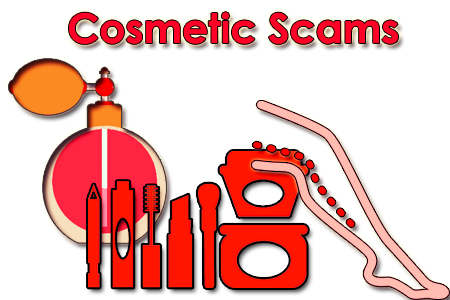Cosmetics Scams
They Sell Imaginary Cosmetic Products
criminals use it for illegal activities. Scamming is becoming the talk of the town, and scammers try to loot money from innocent people in many different ways. There are hundreds of scams listed in scam databases, and one such scam that has become widely known is the scam related to cosmetic products.

Hundreds of people have received cosmetic-related scam emails and have reported them to cybercrime and police authorities immediately. Customers, especially women, often purchase a wide range of cosmetic products online, making them easy targets for scammers who swindle their money. Perpetrators often pose as representatives of branded companies, claiming to sell premium skin solutions at extremely low prices. They send scam emails urging recipients to purchase a skin solution that doesn’t actually exist. Innocent women, trusting the message, may open the email and deposit money into the scammer’s account. The scammer then disappears with the money without delivering any products. Cosmetic scams involving brands like ORO and BH have made the rounds in the past. Similarly, cosmetic scams related to dentistry were also quite prominent for a period.
Some of the popular and ongoing cosmetic scams currently making the rounds are listed below:
Laser scams
In these types of scams, the perpetrators pose as cosmetic surgeons and send scam emails to the public, claiming to offer free liposuction and other cosmetic surgeries. Overweight or stout individuals often fall prey to these scams, responding to the messages and depositing their hard-earned money.
Laser scams involve deceptive practices related to laser treatments, which are commonly used for various cosmetic and medical purposes. These scams can result in financial loss, ineffective treatments, or even serious risks to health and safety. Common characteristics of laser scams include false claims of effectiveness—scammers often make exaggerated or completely fabricated promises about the benefits and outcomes of laser procedures, offering unrealistic results. Additionally, some providers operate without the necessary training, certification, or licenses required to perform laser treatments, putting patients at significant risk. Deceptive advertising techniques, such as manipulated before-and-after photos, are frequently used to mislead potential clients about the effectiveness of the procedures. Hidden costs are another tactic, where victims are lured in with low initial prices but later discover additional, undisclosed fees for follow-up sessions or required aftercare. To protect against laser scams, individuals should thoroughly research providers to ensure they are properly qualified and licensed. Seeking referrals, reading genuine reviews, and asking for credentials are all effective ways to verify a provider’s legitimacy. Additionally, consulting with medical professionals or trusted sources before committing to any laser treatment is essential. If any claims or offers seem too good to be true, it's wise to exercise caution and seek a second opinion from a reputable source. Lastly, reporting suspected scams to consumer protection agencies or appropriate authorities can help prevent others from becoming victims of these deceptive practices.
Dentistry scams
Here the scammers who are operating from different countries will send a scam mail stating that they are offering free dental surgeries to the poor and needy and will request the people to deposit a small amount.
Dentistry scams involve fraudulent practices within the dental industry, where individuals or organizations deceive patients for financial gain or provide substandard or unnecessary treatments. These scams can result in financial losses, compromised dental health, and emotional distress. Common characteristics of dentistry scams include overcharging for services, recommending unnecessary treatments or procedures, and performing substandard work. Some unscrupulous practitioners may even bill for services that were never provided. In some cases, individuals may falsely represent themselves as licensed dentists or offer services without the proper credentials, putting patients at risk. Additionally, deceptive advertising, such as fake testimonials or misleading before-and-after photos, is used to lure in unsuspecting patients. To protect against dentistry scams, patients should research their chosen dentist, verify their credentials and licensure, and seek second opinions for major treatments. They should also be wary of unusually low prices or high-pressure sales tactics. Reporting suspected scams to dental licensing boards or consumer protection agencies can help prevent others from falling victim to fraudulent dental practices.
Israeli scams
Here the scammer will pose as a famous cosmetic seller and send emails requesting clients to purchase cheap products that do not actually exist. Women often fall prey to these scammers and lose their money immediately.
Israeli scams refer to fraudulent activities originating from Israel or involving individuals or entities based in Israel. These scams can encompass a wide range of deceptive practices, including online fraud, investment schemes, and various forms of financial scams. Common Israeli scams have included binary options trading schemes, which were once a significant problem in the country. In these schemes, fraudulent brokers used aggressive tactics to convince individuals to invest in high-risk binary options, often resulting in substantial financial losses. Additionally, some Israeli-based companies have been involved in online dating scams, where they create fake profiles to lure individuals into fraudulent relationships, ultimately leading to financial exploitation. It is important for individuals to exercise caution when engaging with unfamiliar online platforms or investment opportunities, especially those originating from or connected to Israel, and to report any suspected scams to relevant authorities for investigation.
Corporate scams
Hundreds of people have complained about the products launched by the company named Adore Cosmetics and have labeled them scammers.
Corporate scams involve fraudulent activities within businesses or organizations, often perpetrated by employees, executives, or external actors. These scams can have severe financial and reputational consequences for the affected companies. Common corporate scams include embezzlement, where employees misappropriate company funds for personal use, and financial statement fraud, where financial reports are manipulated to present a false picture of a company's financial health. Another example is insider trading, where individuals with privileged information use it to gain an unfair advantage in stock trading. Additionally, Ponzi schemes and accounting frauds have been notable instances of corporate scams, where deceptive practices are used to mislead investors about the company's financial performance. To combat corporate scams, businesses implement robust internal controls, conduct regular audits, and provide ethics training to employees. Reporting suspected scams to relevant regulatory authorities is also crucial in holding perpetrators accountable and preventing future incidents.







